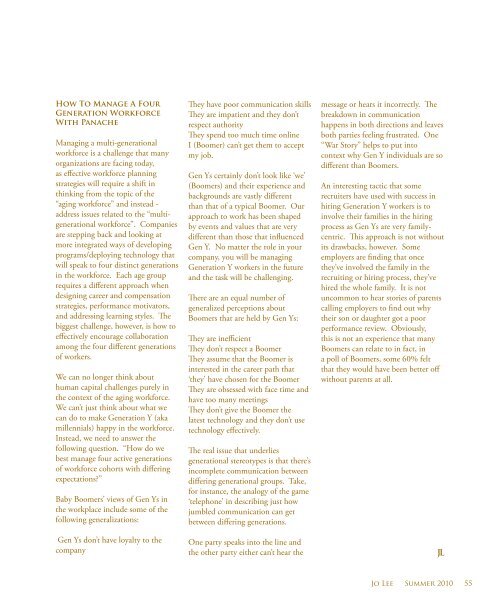Summer 2010 Jo Lee - JO LEE Magazine
Summer 2010 Jo Lee - JO LEE Magazine
Summer 2010 Jo Lee - JO LEE Magazine
You also want an ePaper? Increase the reach of your titles
YUMPU automatically turns print PDFs into web optimized ePapers that Google loves.
How To Manage A Four<br />
Generation Workforce<br />
With Panache<br />
Managing a multi-generational<br />
workforce is a challenge that many<br />
organizations are facing today,<br />
as effective workforce planning<br />
strategies will require a shift in<br />
thinking from the topic of the<br />
“aging workforce” and instead -<br />
address issues related to the “multigenerational<br />
workforce”. Companies<br />
are stepping back and looking at<br />
more integrated ways of developing<br />
programs/deploying technology that<br />
will speak to four distinct generations<br />
in the workforce. Each age group<br />
requires a different approach when<br />
designing career and compensation<br />
strategies, performance motivators,<br />
and addressing learning styles. The<br />
biggest challenge, however, is how to<br />
effectively encourage collaboration<br />
among the four different generations<br />
of workers.<br />
We can no longer think about<br />
human capital challenges purely in<br />
the context of the aging workforce.<br />
We can’t just think about what we<br />
can do to make Generation Y (aka<br />
millennials) happy in the workforce.<br />
Instead, we need to answer the<br />
following question. “How do we<br />
best manage four active generations<br />
of workforce cohorts with differing<br />
expectations?”<br />
Baby Boomers’ views of Gen Ys in<br />
the workplace include some of the<br />
following generalizations:<br />
Gen Ys don’t have loyalty to the<br />
company<br />
They have poor communication skills<br />
They are impatient and they don’t<br />
respect authority<br />
They spend too much time online<br />
I (Boomer) can’t get them to accept<br />
my job.<br />
Gen Ys certainly don’t look like ‘we’<br />
(Boomers) and their experience and<br />
backgrounds are vastly different<br />
than that of a typical Boomer. Our<br />
approach to work has been shaped<br />
by events and values that are very<br />
different than those that influenced<br />
Gen Y. No matter the role in your<br />
company, you will be managing<br />
Generation Y workers in the future<br />
and the task will be challenging.<br />
There are an equal number of<br />
generalized perceptions about<br />
Boomers that are held by Gen Ys:<br />
They are inefficient<br />
They don’t respect a Boomer<br />
They assume that the Boomer is<br />
interested in the career path that<br />
‘they’ have chosen for the Boomer<br />
They are obsessed with face time and<br />
have too many meetings<br />
They don’t give the Boomer the<br />
latest technology and they don’t use<br />
technology effectively.<br />
The real issue that underlies<br />
generational stereotypes is that there’s<br />
incomplete communication between<br />
differing generational groups. Take,<br />
for instance, the analogy of the game<br />
‘telephone’ in describing just how<br />
jumbled communication can get<br />
between differing generations.<br />
One party speaks into the line and<br />
the other party either can’t hear the<br />
message or hears it incorrectly. The<br />
breakdown in communication<br />
happens in both directions and leaves<br />
both parties feeling frustrated. One<br />
“War Story” helps to put into<br />
context why Gen Y individuals are so<br />
different than Boomers.<br />
An interesting tactic that some<br />
recruiters have used with success in<br />
hiring Generation Y workers is to<br />
involve their families in the hiring<br />
process as Gen Ys are very familycentric.<br />
This approach is not without<br />
its drawbacks, however. Some<br />
employers are finding that once<br />
they’ve involved the family in the<br />
recruiting or hiring process, they’ve<br />
hired the whole family. It is not<br />
uncommon to hear stories of parents<br />
calling employers to find out why<br />
their son or daughter got a poor<br />
performance review. Obviously,<br />
this is not an experience that many<br />
Boomers can relate to in fact, in<br />
a poll of Boomers, some 60% felt<br />
that they would have been better off<br />
without parents at all.<br />
JL<br />
<strong>Jo</strong> <strong>Lee</strong> <strong>Summer</strong> <strong>2010</strong> 55
















